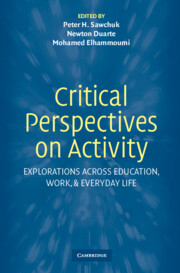Book contents
- Frontmatter
- Contents
- List of Contributors
- Foreword by Seth Chaiklin
- Acknowledgements
- 1 Introduction: Exploring Activity Across Education, Work, and Everyday Life
- SECTION I CRITICAL PERSPECTIVES ON THEORY
- SECTION II EDUCATION
- SECTION III WORK
- 8 Contradictory Class Relations in Work and Learning: Some Resources for Hope
- 9 From Labor Process to Activity Theory
- 10 Values, Rubbish, and Workplace Learning
- SECTION IV EVERYDAY LIFE
- References
- Index
9 - From Labor Process to Activity Theory
Published online by Cambridge University Press: 10 December 2009
- Frontmatter
- Contents
- List of Contributors
- Foreword by Seth Chaiklin
- Acknowledgements
- 1 Introduction: Exploring Activity Across Education, Work, and Everyday Life
- SECTION I CRITICAL PERSPECTIVES ON THEORY
- SECTION II EDUCATION
- SECTION III WORK
- 8 Contradictory Class Relations in Work and Learning: Some Resources for Hope
- 9 From Labor Process to Activity Theory
- 10 Values, Rubbish, and Workplace Learning
- SECTION IV EVERYDAY LIFE
- References
- Index
Summary
INTRODUCTION
As new technologies and new organizational forms proliferate, work is moving back to the center of organizational research (Barley, 1996; Barley and Kunda, 2001). And as interest in work grows, so too does the corresponding theoretical challenge: How best can we apprehend the nature of work itself and its links to both the organizational structure and to the lived experience of work?
This chapter returns to the roots of one of the more prominent theories of work organization, Labor Process Theory (LPT; see Thompson, 1989; Wardell, Steiger, and Meiskins, 1999; Jermier, 1998). Inaugurated by Braverman's “classic” work (1974; classic according to Burawoy, 1996) and inspired by Marx, LPT has been a key influence on critical research on work around the world. Recently, however, LPT has been losing momentum in favor of post-modernist strands of theorizing, in particular, those building on the work of Michel Foucault, where the inspiration comes from Nietzsche rather than Marx.
I argue that one reason for LPT's loss of momentum has been its inability to deal with an increasingly discomforting anomaly. LPT is fundamentally incompatible with the growing consensus that capitalist development has been associated not with the deskilling trend predicted by Braverman, but with a trend toward the upgrading of worker skills and responsibilities. I argue that LPT's inability to accommodate upgrading is due to the one-sidedness of its reading of Marx. This chapter proposes an alternative, more dialectical reading of Marx that may help us better understand the changing nature of work.
- Type
- Chapter
- Information
- Critical Perspectives on ActivityExplorations Across Education, Work, and Everyday Life, pp. 160 - 192Publisher: Cambridge University PressPrint publication year: 2006
- 4
- Cited by

